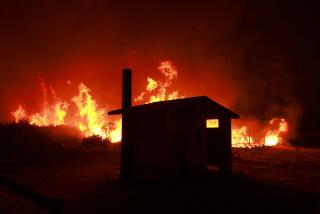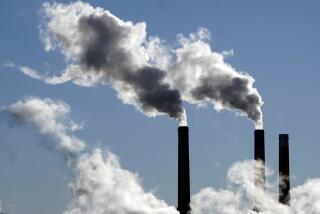On the NTSB’s report on the San Bruno gas pipeline explosion; governors who don’t believe in climate change; and Jonah Goldberg on not believing ‘experts’
A broken system
Re “A failure of the system,” Aug. 31
The San Bruno explosion was the result of a “litany of failures” by Pacific Gas & Electric and lax regulation, according to the National Transportation Safety Board.
PG&E and utility lobbyists consistently used typical arguments to head off proposed pipeline safety regulations requiring automatic shut-off valves, effective inspection methods and accurate record-keeping.
As happens after many accidents, legislators may now have little choice but to ignore industry rhetoric and pass legislation that will strengthen pipeline rules.
In the future, however, after memories of the tragedy fade, we shouldn’t have to wait until lives are lost to pass new laws as industry goes back to claiming that health and safety proposals are “big-government job killers.”
When that time comes, we should just stop listening and respond with Ronald Reagan’s famous phrase: “There you go again.”
Donald Cohen
Los Angeles
Do we ever need a more explosive reason against the cries for deregulation?
Peter Isaacson
Whittier
In what The Times called a “scathing critique,” the NTSB condemned PG&E for the catastrophe in 2010 that killed eight people in San Bruno. The report also lambasted state regulators for abysmal laxity.
So what? The board has no authority to implement or impose; it can only recommend.
Warren Larson
Sunland
Governors in denial
Re “Betting the farm against warming,” Opinion, Aug. 28
As the author points out, there is not yet a political cost to adopting an anti-scientific posture on the threat of climate change.
Too bad for us and our children’s children. Most legitimate scientists (meaning the ones not receiving money from oil interests and others) agree that climate change is here, and it’s real. The Republican argument now is whether it is man-made or not.
So here’s the thing:
If they are right — but Big Oil is still forced to clean up its act — the air will get cleaner and they will have spent a lot of money to do so.
If those of us who oppose them are right — and nothing is done about it — we will have missed an opportunity to curb the destruction of Earth.
Russ Woody
Studio City
Eugene Linden lists a group of Southwestern governors who hold the opinion that climate change is not happening.
They are making or influencing crucial administrative decisions for their states, affecting the future welfare of their citizens, based on their opinions — in the face of overwhelming scientific evidence to the contrary. Therefore, it is incumbent upon them to present credible, convincing evidence supporting their opinions.
If they cannot or will not do this, they are making baseless and irresponsible decisions, are unsuitable for their offices and must be promptly recalled by the thinking citizens of their states.
David Perlman
Laguna Beach
Regardless of the degree to which we believe that the activities of mankind are the cause of changing climate patterns, we ignore them at our peril.
The most elementary standard of care requires that we be aware that these changes will probably affect our infrastructure and crucial services. Whether the future holds more frequent or more violent storms, more or less rainfall or dramatically rising sea levels, if we fail to account fully for possible changes, we will place vital systems and future generations at unnecessary risk.
At the same time, if we overreact today and mandate change based on preliminary or incomplete assessments, we risk wasting limited financial resources.
In the face of such uncertainty, prudence dictates that doing nothing is not an option. But whatever we do today should place minimal constraints on what we may actually need to do tomorrow.
Richard Little
Los Angeles
The writer is director of the Keston Institute for Public Finance and Infrastructure Policy at USC.
Expert opinions — says who?
Re “Surprise, experts aren’t,” Opinion, Aug. 30
I used to tell my students that learning about the past would help them to not repeat mistakes and would give them an inkling about the future.
I now talk with greater circumspection about “wisdom” that we gain by observing the behavior of those who came before us.
“Experts” just continue making predictions. It seems that every world event — such as the collapse of the Soviet Union or the ascendance of terrorism, as well as natural catastrophes, which we should be ready for but aren’t — surprise the powers that be to the same degree they surprise the man on the street.
I was gratified to see our president (a true student of history) not listen to those counseling dramatic gestures regarding the upheavals in Egypt and Libya, but rather calibrate his response to the unfolding of events, over which he realized he had little control.
In crossing a stream, one should test the next rock before shifting one’s weight.
Jack Kaczorowski
Los Angeles
Let me understand this. Jonah Goldberg says that experts can’t be trusted because the results they predict are sometimes wrong. So who to trust then? The drunk next to you at the bar?
If Goldberg, as a conservative, were to follow his own advice, then the clarion call from “economic experts” that lower taxes equal more jobs is just another prediction that hasn’t come true. Tax rates are at their lowest in 50 years, but no new jobs.
It reminds me of the old saying that doing the same thing over and over again and expecting a different result is insanity.
Robert McCall
Los Angeles
If Goldberg is right, then there’s no reason for experts at all in the areas of “politics, economics and climate,” to name his three.
However, this is a foolish observation about who is best qualified to make predictions — even if they’re wrong once in a while. We make decisions based on the best experts we have.
If Goldberg doesn’t like experts, how about observing recent history as a predictor of our plight?
It’s very clear that the economy collapsed over
a huge housing bubble because of the abandonment of any meaningful regulations over Wall Street, that giving huge
tax cuts to the rich hasn’t created jobs and that concern over deficits and cuts in existing programs has exacerbated the economic collapse.
These are the real areas for correction.
And he is also sadly mistaken if he believes that “market-based ideologies” will correct the nation’s problems.
Ralph Mitchell
Monterey Park
Special interests at work again
Re “Bill to regulate California health insurance is shelved,” Business, Sept. 1
The article highlights the negative impact that special-interest lobbying has on the democratic decision-making process.
Once again the financial interests of the few have successfully trumped the legitimate public interests of the many, most likely forcing public recourse options back onto the ballot.
The most telling argument against the measure is the out-and-out greed expressed by doctors and healthcare providers who “feared that artificially low insurance rates would lead to reduced payments for their services.”
The skimming relationship between insurance middlemen, healthcare opportunists and the product-specific hypochondria promoted by pharmaceutical companies must have gotten lost somewhere in their income-to-service relevancy paradigm.
Californians deserve a better deal.
Dale Walters
Rancho Mirage
More to Read
A cure for the common opinion
Get thought-provoking perspectives with our weekly newsletter.
You may occasionally receive promotional content from the Los Angeles Times.










